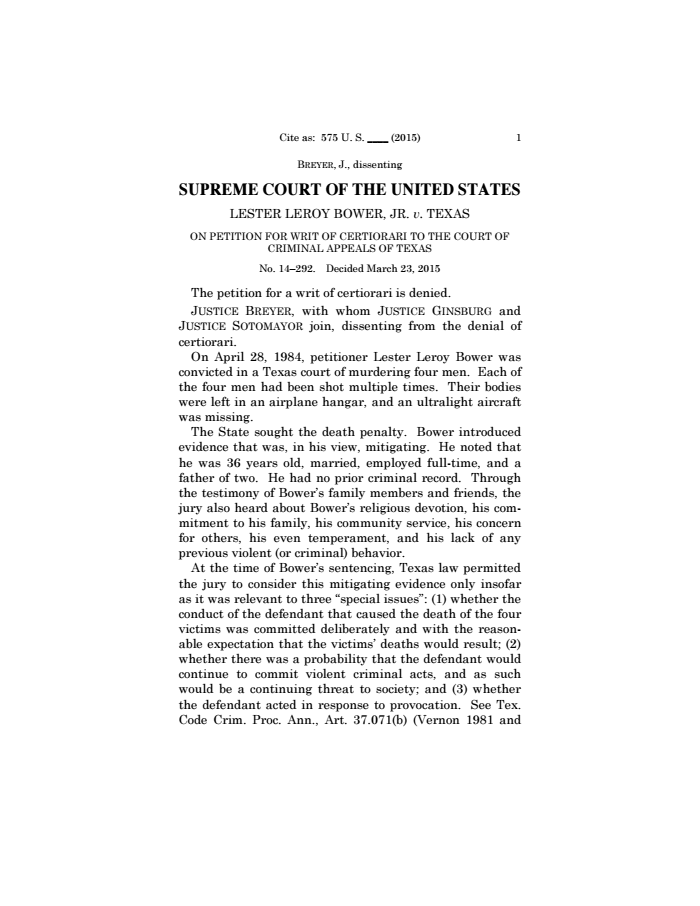
WASHINGTON — The Supreme Court Monday declined to review the death sentence given to Lester Leroy Bower by a Texas judge 30 years ago under guidelines later found to be unconstitutional by the court.
Bower was convicted of capital murder in 1984 after a jury found him guilty of killing four men in a Dallas airplane hangar. Bower maintains his innocence.
Justice Stephen Breyer, joined by Justices Ruth Bader Ginsburg and Sonia Sotomayor, would have heard the case and ordered that Bower be re-sentenced, writing that "the error here is glaring, and its consequence may well be death."
Although it only takes the votes of four justices for the court to hear a case, the fourth of the more liberal justices — Justice Elena Kagan — did not join the dissent and did not vote for the court to take the case. Justice Anthony Kennedy — often the swing vote in such cases — also opposed the court taking on the case.
The problem, as the three dissenting justices see it, is that Bower was sentenced to death under a system later found to be unconstitutional by the U.S. Supreme Court.
During the sentencing phase of his trial, Bower introduced what is known as mitigating evidence, or evidence that would lead to a lesser punishment. This included testimony from family members and friends that spoke to his character.
Texas law at the time, however, dictated that juries could only consider mitigating evidence as it related to three "special issues": whether the defendant acted deliberately and with expectation that their actions would result in the victims' deaths, whether the defendant could be a continuing threat to society, and whether the defendant was provoked.
The the third issue didn't apply to Bower's case, so the jury was only asked to consider mitigating evidence as it related to the first two questions. The jury answered yes to both, requiring the judge under Texas law to automatically impose the death sentence.
The Supreme Court struck down the "special issues" procedure used by Texas five years after Bower's sentencing. When Bower sought to have his sentence thrown out initially, the federal courts denied his request, deciding that the the second "special issue", which asked about "future dangerousness," allowed the jury to sufficiently consider Bower's mitigating evidence.
Although the federal appeals court later "changed its mind about" the meaning of the Supreme Court case, as Breyer put it on Monday, Bower's case was no longer before it.
In 2012, however, a Texas trial court agreed with Bower and ordered a new sentencing proceeding. When the state appealed, the Texas Court of Criminal Appeals reversed — drawing a distinction between "double-edged" evidence that could be seen as both aggravating and mitigating, at issue in the 1989 Supreme Court case, and evidence that is purely mitigating, as with Bower — which led to the request before the Supreme Court.
Although Breyer "recognize[d] that we do not often intervene only to correct a case-specific legal error," he wrote that the court should have done so here because "the error here is glaring, and its consequence may well be death."
Concern about whether Bower will be able to bring his claim to the court again led Breyer to conclude: "I believe we should act and act now. I would grant the petition and summarily reverse the judgment below."
While the justices considered Bower's request to hear his appeal, the Supreme Court had granted him a stay of execution. The stay "terminate[d] automatically" on Monday when the court declined to take his case, meaning Texas could now schedule a new execution date for him.
The Supreme Court already has agreed this year to hear two cases relating to the death penalty — one relating to the use of the drug midazolam, which has been in use in several executions where problems were encountered in 2014, and the other relating to Florida's death penalty sentencing process, which does not require a unanimous vote of the jury to sentence someone to death.
The justices will hear the lethal injection case on April 29, and it will hear the Florida case next term, which begins in October.

